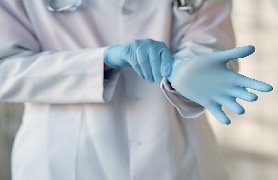Industries
Attorneys
Ohio Health Care Facilities to Reopen for Medically Necessary Procedures
State and Federal Guidance Provides Direction for the Responsible Reopening of Health Care
 On April 27, 2019, Governor Mike DeWine and Dr. Amy Acton made a joint announcement about their plan to restart Ohio’s economy amid the COVID-19 pandemic. Health care will be the first sector of the economy to restart services beginning May 1, 2020.
On April 27, 2019, Governor Mike DeWine and Dr. Amy Acton made a joint announcement about their plan to restart Ohio’s economy amid the COVID-19 pandemic. Health care will be the first sector of the economy to restart services beginning May 1, 2020.
According to the announcement, health care providers may resume all medically necessary procedures that do not require an overnight stay in a health care facility. Overnight stays for certain life threatening and severe conditions, however, continue to be permitted. In addition, medically necessary procedures that involve minimal use of personal protective equipment (PPE) and do not require inpatient hospital admission may proceed. Permitted health care services include regular doctor visits, well-care checks, well-baby visits, out-patient surgeries, imaging procedures and diagnostic tests. If a safe environment is established, dental services and veterinary care also may resume. Providers and facilities must adhere to infection control practices, have sufficient PPE and discuss the risk of contracting COVID-19 with patients as they resume health care services.
Dr. Amy Acton announced on April 22, 2020, that Ohio health care providers in hospitals and outpatient surgery centers also should begin to reassess elective procedures and surgeries that have been postponed. Physicians and patients should consider the patient’s health situation in making a decision about whether to proceed, including the effect that any chronic conditions may have on the patient’s quality of life. Physicians should also inform patients of the risk of contracting COVID-19 and how that might impact the recovery process.
In addition to the information provided by the State of Ohio, the federal government has offered guidance on reopening health care facilities for non-COVID-19 care. On April 16, President Trump issued Guidelines for Opening Up America Again to be followed by states as COVID-19 cases decline. The first phase of the three-phase approach includes allowing health care facilities, in areas with low and stable COVID-19 cases, to again provide patients with essential care for non-emergent, non-COVID-19 needs. April 19, 2020, guidance by the Centers for Medicare and Medicaid Services (CMS) provides health care facilities with recommendations as they re-open for such care.
States that pass Gating Criteria related to symptoms, cases and hospitals may proceed to Phase 1 and restart essential, non-COVID-19 care in regions with low incidence of the virus for patients without COVID-19. CMS encourages facilities to continue to utilize telehealth services where appropriate and to collaborate with state public health authorities to ensure that facilities, workforce, testing and supplies can support non-COVID-19 care and respond to a surge in COVID-19 cases, if necessary. Care that had been postponed by previous CMS recommendations such as certain surgeries and procedures, chronic disease care and preventative care may now be provided in accordance with the following general considerations:
- In coordination with state and local public health officials, evaluate the incidence and trends for COVID-19 in the area where re-starting in-person care is being considered.
- Evaluate the necessity of the care based on clinical needs. Providers should prioritize surgical/procedural care and high-complexity chronic disease management; however, select preventive services also may be highly necessary.
- Consider establishing Non-COVID Care (NCC) zones that would screen all patients for symptoms of COVID-19, including temperature checks. Staff would be routinely screened as would others who will work in the facility (physicians, nurses, housekeeping, delivery and all people who would enter the area).
- Sufficient resources should be available to the facility across phases of care, including PPE, healthy workforce, facilities, supplies, testing capacity and post-acute care, without jeopardizing surge capacity.
The guidance also provides more specific recommendations related to PPE, workforce availability, facility considerations, sanitization protocols, supplies and testing capacity. CMS recommends that facilities continually evaluate the risk of COVID-19 in their region and be prepared to cease non-essential procedures in the event of a surge.
Should you have any questions concerning reopening health care facilities, please contact Ms. Rubin.
Anna L. Crisp, a law clerk with Eastman & Smith who is finishing her third year at The Ohio State University Moritz College of Law, contributed to this article.
___________________
Disclaimers:
At the date of publication the above information was correct. It is quite possible the information above has changed as COVID-19 is a rapidly evolving situation.
The article in this publication has been prepared by Eastman & Smith Ltd. for informational purposes only and should not be considered legal advice. This information is not intended to create, and receipt of it does not constitute, an attorney/client relationship.
